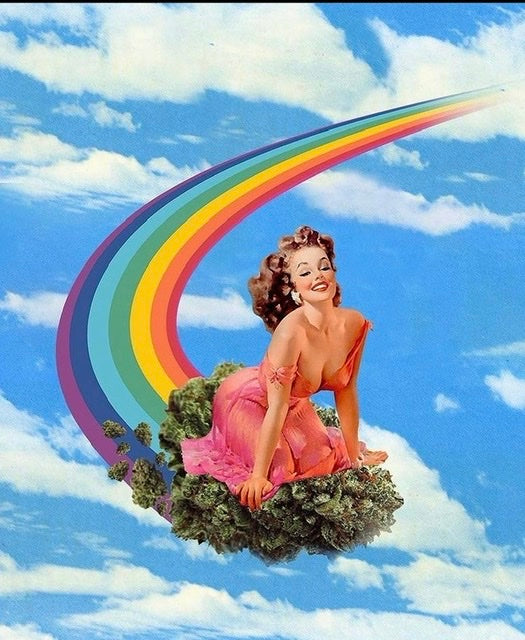Written By: Lisa Marie
Misunderstood. Marginalized. Underrepresented.
All 3 words can be used to describe both the LGBT and cannabis communities. When you consider the events from the past, along with the current and continuous fight for equal rights for the future, the common ground shared by folks in both groups is undeniable.
In order to better understand the close connection between both communities, it’s important to take a look back. Read on to learn more about the pioneers of the LGBT and cannabis communities who worked together to create change and fight for the freedoms we have today.
Dennis Peron- The Father of Medical Cannabis
When we think of Cannabis and LGBT activism, Dennis Peron is arguably the most important and influential figure in history. Born in NY in 1945, Peron began his journey with cannabis during the 1960’s. After serving in the Air Force during the Vietnam War, Peron returned to the U.S. from Vietnam with 2 pounds of weed stashed in his luggage and made his way to the LGBT-friendly Castro District in San Francisco.
By the middle of the 1970’s, Peron was selling cannabis out of a few locations– his home, a restaurant he owned called “The Island,” which was later used as a political campaign headquarters site for Harvey Milk, as well as some storefronts in the Castro area. At that time, Peron was on a first name basis with his customers who often became his friends.
Despite there being a more cannabis tolerant vibe in San Francisco in the 70’s, Peron was involved in over 20 encounters with law enforcement, ranging from raids of his home and businesses, to being shot by a plain clothes officer. Peron was even arrested for possession of 200 pounds of cannabis, and served a 6 month jail sentence.
But struggles with police and going to jail never stopped Peron from fighting for folks to have the right to access and grow cannabis. In fact, Peron’s activism spiked in the 1980’s at the height of the AIDS epidemic. In the midst of the government’s “War on Drugs,” Peron continued to rail against antiquated laws and out of touch politicians because he believed so strongly in the power of medicinal cannabis.
In 1990, after Peron’s partner Jonathan West lost his battle with AIDS, Peron wanted to honor his spirit and ensure that others could have access to the life changing medicinal benefits of cannabis for people living with AIDS and other illnesses. Peron was a driving force behind Proposition P, which aimed to provide access to medical marijuana for San Franciscans by lowering the penalty for cannabis possession. In 1991, Peron created the first medical marijuana dispensary in the U.S. called The San Francisco Cannabis Buyers’ Club, which had amassed over 8,000 members before it closed in the mid 90’s.
After a lifetime of activism and advocacy, one of the most significant achievements for Peron came with the passing of Proposition 215 in 1996. It allowed for medical cannabis to be legalized in the state of California. Finally, after decades of work and dedication, Peron’s desire for people to have the freedom to choose cannabis for palliative care had materialized.
Without Peron’s unwavering efforts, it’s unlikely that we would have nearly 40 U.S. states where medical cannabis is legal today. Peron said, “The passing of 215 lit a fuse around the world,” and there’s no doubt he was right.
In addition to being a cannabis and queer rights advocate until his passing in 2018, Peron supported the inclusion of women and POC in the cannabis industry, and strongly opposed jail sentences for cannabis use. Peron once stated, “If you want to know the future, emulate the past.” In today’s uncertain times, Dennis Peron’s words are as relevant and powerful as ever.
“Brownie Mary” aka Mary Jane Rathbun- LGBT Activist and Medical Cannabis Pioneer
Mary Jane Rathbun is an iconic figure in both the LGBT and cannabis communities. Born in 1922, Rathbun’s journey into canna culture began with a side hustle when she was a waitress at an IHOP restaurant. By the late 1970’s, Rathbun, who earned the nickname “Brownie Mary,” had been selling dozens of homemade THC infused brownies each day in her community of Castro in California.
After a few years, “Brownie Mary” began to notice that her self-described “magically delicious” brownies were not just getting people high. They were providing pain relief and symptom management for people suffering from illnesses such as cancer. When the AIDS epidemic hit in the early 1980’s, Mary started bringing her infused brownies to AIDS and cancer patients in San Francisco General Hospital’s Ward 86.
When word spread about the work Mary was doing to help chronically ill patients, local growers donated bags of cannabis to support her efforts. Eventually, Mary was arrested in 1981 at the age of 57 for having over 18 pounds of cannabis in her home.
While Mary continued to volunteer at Ward 86, she served her sentence of 500 hours of community service working at a gay thrift store, a soup kitchen, and in a Shanti Project hospice program for people with HIV and AIDS. Mary’s work as an ally with the LGBT community and folks with AIDS in the 1980’s is significant, because she provided care and support when many other volunteers and health care workers refused to do so out of fear and misunderstanding.
Mary’s activism continued into the 1990’s when she joined forces with Dennis Peron to help pass Proposition P, which led to the passing of Proposition 215 to legalize medical cannabis in California in 1996. “Brownie Mary '' and Dennis Peron went on to co-author a cannabis cookbook. Surprisingly, the book doesn’t include the famous brownie recipe, which has never been revealed to the public.
With or without the original recipe, “Brownie Mary” is regarded as the inventor of the THC brownie. If not for her innovation, the infused edibles we have come to know and love today, which created $3.4 billion in revenue in 2022, may never have been invented.
Although “Brownie Mary” passed away in 1999, she is remembered decades later for the unwavering support and care she provided to the AIDS patients from the LGBT community she lovingly referred to as her “kids.” In 1992, as a testament to her fighting spirit, Mary famously said, "If the narcs think I'm gonna stop baking brownies for my kids with AIDS, they can go fuck themselves in Macy's window."
Paul Scott- African American Activist for LGBT Rights and Cannabis Legalization
Paul Scott is another pioneer at the intersection of the LGBT and cannabis communities. Scott was a military medic before he began working as a nurse in the AIDS ward of a Los Angeles hospital. Being a healthcare worker on the front lines at the height of the AIDS crisis in the 80’s took its toll on Scott, so he made the decision to leave nursing and return to college.
Scott, who had met Dennis Peron and frequented his San Francisco Cannabis Buyers Club, was a patron until the club was closed in the mid 90’s. Scott was then asked to join the Oakland Cannabis Buyers’ Commission as the Chairman of the Board. Despite the fear of being shut down by anti cannabis lawmakers, the Oakland club remained open for years. Some people have speculated that the Oakland club survived longer than anticipated due to the efforts of Nate Miley, an African American city council member who worked hard to provide access to cannabis for his community.
Eventually, the Oakland club was shuttered, and Scott was forced to move on. At this point, Scott had just been diagnosed with HIV, and securing medical cannabis was critical to help alleviate some of the symptoms he was experiencing as a result of his treatment. Fortunately, Scott joined a cannabis club in Inglewood. With the support of a city council including African American representation, Paul Scott was able to run the club successfully for 12 years.
Paul Scott continues to be an important figure in the cannabis and LGBT communities today. Scott has held several integral roles in advocating for the rights of African American gay men. In addition to being L.A. County’s Commissioner for HIV/AIDS for 6 years in the early 2000’s, Scott created the Inglewood Wellness Center and was president of an L.A. Black Pride event called At the Beach.
Kiyoshi Kuromiya- Medical Cannabis and Human Rights Activist
A lesser known, but extremely impactful member of the LGBT and cannabis communities is Kiyoshi Kuromiya. Born in 1943 to parents who were held at a Japanese Internment Camp in Wyoming, Kuromiya began his journey as a human rights advocate from an early age.
Kuromiya was an active participant in the Civil Rights Movement of the 1960’s. In March of 1965, he led a group of high school students in a protest march in Montgomery, Alabama– the site of the historic protest led by Dr. Martin Luther King, Jr. During the protest, Kuromiya was brutally beaten by police and hospitalized from the injuries he sustained.
In 1970, Kuromiya was a founding member of the Gay Liberation Front. At that time, Kuromiya gave a presentation about gay rights to members of the Black Panther Party. Kuromiya forged a bond with Black Panther Party co-founder Huey P. Newton, which helped to shine a light on the common ground shared by people fighting for the rights of marginalized people everywhere.
During the AIDS epidemic of the 1980’s, Kuromiya was an activist and advocate for people living with HIV and AIDS. He started a newsletter which led to a website that was designed to share the latest information and scientific breakthroughs related to AIDS. Kuromiya even created a way for people to access the internet in his apartment for free, and provided a 24 hour hotline to share the latest information about HIV and AIDS.
Kuromiya’s most significant contribution to the cannabis community came after being the lead plaintiff in a 1999 Supreme Court case designed to provide AIDS patients with access to medicinal cannabis to treat the side effects of AIDS, such as nausea and wasting syndrome. Although Kuromiya lost the case, his work certainly began the normalization of using cannabis as medicine for folks living with AIDS as well as a range of other illnesses.
Sadly, Kiyoshi Kuromiya lost his battle with AIDS in 2000 at the age of 57. His lifelong dedication to activism for causes affecting civil rights, LGBT rights, and access to cannabis as medicine can serve as an inspiration today as we continue to fight for equality and freedom for all.
Conclusion
In today’s world, it’s easy to forget the incredible strides that were made by LGBT folks and cannabis activists from the past. It’s also easy to lose sight of the struggles and challenges all of us continue to face when we focus only on what makes us different.
It’s important to reflect on those who came before us– people who fought tirelessly, often side by side, for the ability to access cannabis as medicine and the opportunity to live our truth without persecution. As we move forward at a time when the powers that be are trying desperately to hold us back, we need to remember that without freedom for all, there is freedom for none.

